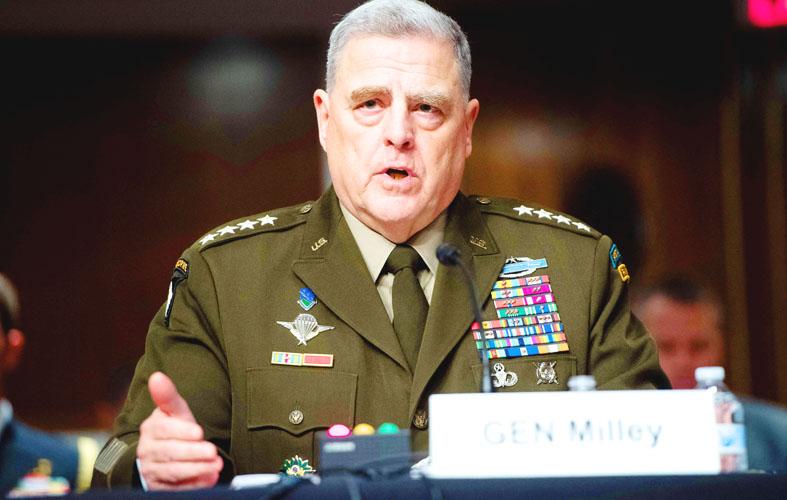Making Taiwan a “very difficult objective to take” is the nation’s best defense strategy, and the US can help as it has with Ukraine against Russia, US Joint Chiefs of Staff Chairman General Mark Milley said on Thursday.
“Taiwan is a defensible island. We just need to help the Taiwanese to defend it a little bit better,” Milley told a US Senate Armed Services Committee budget hearing.
He was responding to a question from US Senator Rick Scott on whether proposed military spending for next year was enough to deter a Chinese military attack.

Photo: AFP
Milley said that “the best defense of Taiwan is done by the Taiwanese” with US support, and that the key to deterrence was to “make sure that the Chinese know that if they were to attack Taiwan, it’s a very, very difficult objective to take.”
China has observed several lessons in Russia’s invasion of Ukraine, including the challenges of conducting an amphibious or air assault on Taiwan with its millions of people, Milley said.
In his written testimony, Milley said that China is continuing to develop significant nuclear, space, cyber, land, air and maritime military capabilities, and that “they are working every day to close the technology gap with the US and its allies.”
“In short, they remain intent on fundamentally revising the global international order in their favor by mid-century, they intend to be a military peer of the US by 2035 and they intend to develop the military capabilities to seize Taiwan by 2027,” Milley said.
Also responding to a question asked by Scott, US Secretary of Defense Lloyd Austin defended the Pentagon’s spending proposal, saying its focus on investments in technology, cyberspace and undersea capabilities would help with deterring China and confronting the existing challenge of Russia.
He said the US considered China to be “a now and forever problem in terms of a challenge” that would evolve.

TRAGEDY STRIKES TAIPEI: The suspect died after falling off a building after he threw smoke grenades into Taipei Main Station and went on a killing spree in Zhongshan A 27-year-old suspect allegedly threw smoke grenades in Taipei Main Station and then proceeded to Zhongshan MRT Station in a random killing spree that resulted in the death of the suspect and two other civilians, and seven injured, including one in critical condition, as of press time last night. The suspect, identified as a man surnamed Chang Wen (張文), allegedly began the attack at Taipei Main Station, the Taipei Fire Department said, adding that it received a report at 5:24pm that smoke grenades had been thrown in the station. One man in his 50s was rushed to hospital after a cardiac arrest

A car bomb killed a senior Russian general in southern Moscow yesterday morning, the latest high-profile army figure to be blown up in a blast that came just hours after Russian and Ukrainian delegates held separate talks in Miami on a plan to end the war. Kyiv has not commented on the incident, but Russian investigators said they were probing whether the blast was “linked” to “Ukrainian special forces.” The attack was similar to other assassinations of generals and pro-war figures that have either been claimed, or are widely believed to have been orchestrated, by Ukraine. Russian Lieutenant General Fanil Sarvarov, 56, head

SAFETY FIRST: Double the number of police were deployed at the Taipei Marathon, while other cities released plans to bolster public event safety Authorities across Taiwan have stepped up security measures ahead of Christmas and New Year events, following a knife and smoke bomb attack in Taipei on Friday that left four people dead and 11 injured. In a bid to prevent potential copycat incidents, police deployments have been expanded for large gatherings, transport hubs, and other crowded public spaces, according to official statements from police and city authorities. Taipei Mayor Chiang Wan-an (蔣萬安) said the city has “comprehensively raised security readiness” in crowded areas, increased police deployments with armed officers, and intensified patrols during weekends and nighttime hours. For large-scale events, security checkpoints and explosives

PUBLIC SAFETY: The premier said that security would be tightened in transport hubs, while President Lai commended the public for their bravery The government is to deploy more police, including rapid response units, in crowded public areas to ensure a swift response to any threats, President William Lai (賴清德) said yesterday after a knife attack killed three people and injured 11 in Taipei the previous day. Lai made the remarks following a briefing by the National Police Agency on the progress of the investigation, saying that the attack underscored the importance of cooperation in public security between the central and local governments. The attack unfolded in the early evening on Friday around Taipei Main Station’s M7 exit and later near the Taipei MRT’s Zhongshan